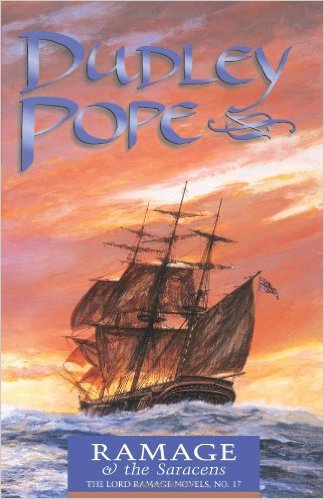Here is the seventeenth of eighteen Lord Ramage Novels, a series about a British naval officer whose wit and dash brought confusion to the French and their allies during the wee years of the 19th century. Still commanding the frigate Calypso with the same officers and men who have been with him on so many adventures, Ramage once again proves to be a shrewd tactician and an admirable leader, blessed with more than his fair share of good luck.
His first stroke of luck is surviving an encounter with two French line-of-battle ships which take him by surprise, especially after the Battle of Trafalgar seemingly wiped the French off the sea. He then gives two French frigates a good pounding, sinking one and capturing the other, all without pleasing the admiral on the Naples station whose only concerns seem to be head money, prizes, and promoting the careers of his favorites. Since Ramage isn’t one of these (somehow, he never is one of his admiral’s favorites), he gets sent away one some dirty and thankless jobs. And though the admiral seems to have expected him to fail, he ekes out two daring victories against the most terrible and desperate foe: Saracens. Muslim warriors from off the coast of Africa, made fearless by the belief that death in battle against the infidel means instant Paradise. (Political Incorrectness Advisory: Teachers, there are some school districts where recommending this book could cost you your job.)
The Saracens have been raiding ports along the southern coast of Sicily, seizing fishing boats, strong men to row their galleys, and the nubile women to populate their brothels. Without any hope of saving those already taken, Ramage works out where the Saracens will strike next and sets a trap for them with his ship’s carronades and swivel guns, musket-bearing marines, and seamen armed with cutlass, pike, and tomahawk. Even so they are outnumbered two to one, and the resulting fierce battle is touch-and-go. Even more dangerous, however, is his second mission. In command of a flotilla of two frigates and two sloops, and reinforced by three hundred soldiers, Ramage is to attack the Saracens’ base and rescue their Sicilian slaves. What he had earlier dismissed as undoable must now be done, even though no charts exist for the (fictional) Saracen base of Sidi Rezegh.
Ramage is an unusual commander for his time. In some ways, perhaps, he may even be anachronistic: a man of present-day sensibilities thrown back into history. In a era when human life was spent with ruthless prodigality, Ramage is one leader who values the lives of his men and who takes every measure—indeed, every risk—to keep casualties to a minimum. If his inner life is troubled by anything, it is by preemptive guilt before every battle for the cost in lives should anything go wrong. Yet his men adore him, as do more women than he can really handle—and it is this book which “closes the circle” as to the fate of one of them. Just when you start to lose patience with his woolgathering over the Marchesa Gianna, the point of keeping her in the picture becomes clear. Trust Dudley Pope to make sure that his characters’ interior monologues bear either an instructive purpose or a clue toward coming events.
And so, with only one more adventure (Ramage and the Dido) still to come, we brace ourselves for the end of a series of noble exploits, penned by an accomplished naval historian whose works, in addition to the Ramage series, include seven more novels and twelve works of nonfiction.
Recommended Age: 14+



